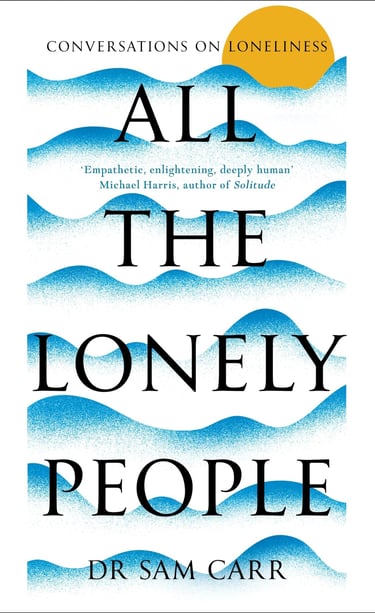Finding Meaningful Connection in an Age of Loneliness with Dr Sam Carr
We explore hidden opportunities within loneliness, drawing on insights from Dr. Sam Carr's talk at Exhale Festival. Sam explores how loneliness can act as a catalyst for personal growth, authenticity, and connection. Featuring ten takeaways, it helps to reimagine loneliness as a gateway to renewal and reframing it as a path toward self-discovery and deeper connections.
INSPIRING STORIESPSYCHOLOGY
1/5/20255 min read


In a world that celebrates connection, loneliness often feels like a taboo subject... A silent struggle many endure but few discuss openly. As part of Exhale Festival 2024, Dr. Sam Carr shared the nuances of loneliness and its transformative potential. Here are some of the key insights.
What is loneliness?
As a scholar of loneliness, he calls out that loneliness can mean something very different for everyone. 100 people talking about their story of loneliness can all be speaking about loneliness and all the states it can be. Not to be quick to understand what it means for everyone until you hear each person's story. If it is about disconnection - we then explore is it becoming more pervasive?
Is loneliness becoming more common in modern times?
He likes a quote by James Hillman - that to be alive is to be lonely - none of us are going to escape it at some point during our lifespan, though sometimes at times we don’t expect it. Even those who say “I’m never lonely” will get visits from loneliness. People will always have felt lonely but our relationship has changed in current society. We are now quite quick to medicalise in modern times - we immediately want to get rid of the suffering. Medicalising feelings we do not like that are inevitable - is that always a good idea? He wonders if loneliness is the idea to cure it or the idea to live alongside it? Are we creating societies that are not used to solitude at times where we need it?
What is the solution to feeling lonely?
Often people feel that connections with other people must be the solution. He feels this is a myth, not always the case. Some people can be in a group of people and feel invisible. People have to understand what meaningful connections are for themselves. Dr Sam feels for him he feels less lonely when he’s leaning into things that are meaningful to him (both human and non human). Humans are not always the answer to everything - previous civilisations were more connected to other elements too. Ask for you when you feel most alone and least alone? It is not necessarily just when spending time with others. Best way to live with loneliness can also be asking, acknowledging, allowing it and exploring why it is there. One person he spoke with said it used to feel embarrassing but to let it in can be soothing, sharing it and reading other stories about loneliness can feel like a warm hug. Loneliness can be the glue that binds us together as humans. The only way to understand people's loneliness is by hearing their story.
The Story of Nicole: Finding Rebirth at 77
Nicole’s story was a centrepiece of the talk. At 77, she found herself at a crossroads, with many of the roles that had defined her life no longer relevant. She had been a mother, a professional, a caregiver- each role deeply meaningful, yet transitory. This transition left her in a space she initially found herself lost, like being in a desert.
But Nicole didn’t see this as the end. Instead, she reframed her loneliness as an opportunity to discover a new version of herself. She described it as meeting an "aromatic Nicole," a freer, more authentic self who had been waiting within her all along. Nicole’s story underscores the idea that loneliness, while challenging, can be a catalyst for profound personal growth. Her experience serves as a powerful reminder that life’s later stages can hold unexpected beauty and renewal.
10 Key Takeaways on Loneliness and Reconnection
1. Loneliness as a Signal for Growth
Nicole’s journey illustrates that loneliness can signify a transitional phase, a time to shed old roles and rediscover new aspects of oneself. It’s not merely an absence but a space for reflection and rebirth.
2. Challenging Societal Narratives on Aging
Society often frames aging as a decline, a time when one’s value diminishes. Nicole’s experience flips this narrative, showing that later life can be a period of reinvention and self-discovery.
3. Identifying "What’s Missing"
Loneliness often stems from a sense of absence. Sam reflected on the importance of recognising these gaps, whether they relate to meaningful relationships, creative outlets, or a sense of purpose.
4. Reassessing Friendships
Middle age often brings a reevaluation of relationships. Many discover that some friendships are toxic or superficial. This realisation can serve as a turning point, prompting a search for deeper, more fulfilling connections.
5. Beyond Human Connection: Spirituality and Nature
Fulfilment isn’t always found in human relationships. Many participants spoke about exploring spirituality, nature, or creative pursuits as alternative sources of meaning and connection.
6. Destigmatising Loneliness
Loneliness is often stigmatised, treated like a shameful secret. He emphasised the importance of normalising these feelings, making it easier for people to share and seek support.
7. Expressing Loneliness Through Creativity
Dr Sam highlighted the therapeutic value of externalising loneliness through art, writing, or other creative outlets. Bottling up these feelings can lead to stagnation, while expression helps provide relief and clarity.
8. Embracing Authenticity
He highlighted the importance of being authentic on what is truly important to you. Each person’s loneliness is unique, and their journey must align with their truth and circumstances.
9. Finding Your Tribe in Vulnerability
A tribe doesn’t have to be a conventional group; it can form through shared vulnerability. Creating places in society where people can share our stories (even within families this does not always come out).
10. The Importance of Support Systems
Accessible mental health support is crucial. Whether through professionals, community groups, or friends, creating safe spaces for emotional expression is vital for addressing loneliness constructively.
Reframing Loneliness as an Opportunity
Loneliness often feels like a void, but as Nicole’s story and the other points reveal, it can also be a space for transformation. By shifting our perspective and embracing this challenging emotion, we open ourselves to growth, renewal, and a deeper understanding of who we are.
For those grappling with loneliness, consider asking yourself: What might this experience be teaching me? What new version of myself could emerge from feeling lonely? Nicole felt loneliness was not an end, but a beginning.
If this resonates with you, know that you’re not alone. Sharing your experiences and seeking support can be powerful first steps. Remember, loneliness may feel isolating, but it’s also a universal human experience that holds the potential for connection and growth.
Curious for more?
Hear more people's stories in Dr Sam's book "All the Lonely People: Conversations on Loneliness".




